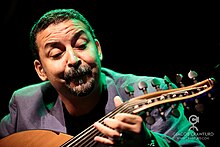Driss El Maloumi
Driss El Maloumi | |
|---|---|
 Driss El Maloumi | |
| Background information | |
| Born | 25 May 1970 |
| Origin | Agadir, Morocco |
| Genres | Arabic music, Berber music, African popular music |
| Occupations |
|
| Years active | 1990–present |
| Website | Official webpage |
Driss El Maloumi (born 25 May 1970) is a Moroccan composer and performer on the oud, the Arabic short-necked lute. He is mainly known for playing solo or in trio formations under his own name, for his long-standing cooperation with Catalan musician and musical director Jordi Savall, as well as for being a member of the group 3MA, comprising three popular African string instrumentalists.
Life and artistic career
[edit]El Maloumi was born in Agadir, in southern Morocco, and comes from a Berber family.[1] After studying Arabic Literature at Ibn Zohr University in Agadir, he finished his academic studies with a thesis on the philosophical approach to musical expression in artistic discourse. At the same time, he devoted himself to practical training on the oud and to his studies in both Arabic and Western classical music. In the early 1990s, he won several national awards for the oud, for example the Prix d'Honneur from the National Conservatory of Music in Rabat.[2] Apart from his work as musician, he directs the conservatory of music in Agadir.[3]
In several of his musical projects dedicated to musical affinities between Europe and the Mediterranean, musical director Jordi Savall invited Driss El Maloumi to his ensemble Hespèrion XXI to represent Middle Eastern musical traditions with his oud playing.[4]
With his solo performances, El Maloumi has presented his own compositions, as well as the occasional Berber folk tune. Further, he has been invited to play with international musicians coming from backgrounds as varied as jazz, Indian music or the historical music of Al-Andalus.[2] He also appears with his own trio, including two percussionists from Agadir,[3] and was invited to play at the Institut du Monde arabe in Paris in 2013.[5] In 2014, he participated at WOMEX festival in Santiago de Compostella, Spain, and the following year, at the International Africa Festival in Würzburg, Germany.[6]
In 2023, his album Aswat (Sounds) was distinguished with the German Record Critics’ Award in the category Traditional Ethnic music.[7] This album was by online magazine World Music Central for its "brilliant call and response interaction" between El Maloumi's oud and "captivating North Africa and Middle Eastern percussion."[8]
El Maloumi also composed orchestral versions of his music for oud, percussion and symphony orchestra, titled Tafassil (Details). For 30 November 2023, the Driss El Maloumi Trio, accompanied by the Austrian Tonkünstler orchestra, are scheduled to perform at the prestigious Musikverein concert hall in Vienna.[9]
3MA African string trio
[edit]Since 2008, El Maloumi has been a member of 3MA musical group, an award-winning trio of African string instruments, playing their own contemporary compositions. The other members are kora player Ballake Sissoko from Mali and Rajery from Madagascar on valiha.
In his review of 3MA's first album, entitled 3MA - Madagascar, Mali, Maroc, British music critic Charlie Gillett named their music "satisfyingly unclassifiable",[10] and world music magazine Songlines, where the album reached the highest position in its world music charts, qualified the trio's style as "African Chamber Music".[11]
Apart from their own albums, the musicians of 3MA have also participated in the musical project The Routes of Slavery. They were invited to join their compositions, relating to the history of the slave trade from Africa, by the artistic director of this project, Jordi Savall, with whom Driss El Maloumi has played the oud on numerous albums.[12]
Discography
[edit]Solo or with his own trio
- Maroc: L'âme Dansée (Buda Records, 2003)
- Makan (Contre-jour, 2013)[3]
- Aswat (Contre-jour, 2023)
with Jordi Savall's Hespèrion XXI
- Orient — Occident, 1200-1700 (2006) and several other albums
- The Routes of Slavery, DVD and 2 CDs with booklet, (2016)[13]
with 3MA
- 3MA (2008), Transglobal World Music Charts in January 2008[2]
- Anarouz (2017), Songlines Music Awards 2019[14]
on CD "Songlines Top of the World" (2014)
- Douceur pour 2 'R', from his album Makan[15]
See also
[edit]References
[edit]- ^ "3MA (Ballaké Sissoko, Driss El Maloumi, Rajery)". Six Degrees Records. 10 November 2017. Retrieved 8 February 2021.
- ^ a b c "Driss El Maloumi - WOMEX". www.womex.com. Retrieved 3 February 2021.
- ^ a b c "Driss El Maloumi - Odyssée". ACCR - Heritage Sites for Culture. Retrieved 15 February 2021.
- ^ Kozinn, Allan (23 February 2009). "A Comparison of the Old and the New (Published 2009)". The New York Times. ISSN 0362-4331. Retrieved 3 February 2021.
- ^ "Driss El Maloumi". Ethnocloud. Retrieved 3 February 2021.
- ^ "ALL BANDS". Africa Festival. 21 December 2015. Retrieved 3 February 2021.
- ^ German Record Critics’ Award. "Traditional Ethnic Music - Driss El Maloumi - Aswat". www.schallplattenkritik.de. Retrieved 22 August 2023.
- ^ "Driss El Maloumi Unveils Oud and Percussion Project | World Music Central". 21 March 2023. Retrieved 22 August 2023.
- ^ "Arabic Sounds | Tafassil". www.tonkuenstler.at. 29 November 2023. Retrieved 22 August 2023.
- ^ "Review: Ballake Sissoko, Driss El Maloumi, Rajery - 3MA". the Guardian. 12 July 2008. Retrieved 3 February 2021.
- ^ "3MA: African Chamber Music". Songlines. Retrieved 3 February 2021.
- ^ "Jordi Savall: The Routes of Slavery". www.lincolncenter.org. Archived from the original on 18 October 2018. Retrieved 8 February 2021.
- ^ "Jordi Savall Explores the Musical Legacy of 'The Routes of Slavery'". KQED. Retrieved 3 February 2021.
- ^ "Songlines Music Awards 2019". Songlines. Retrieved 3 February 2021.
- ^ "Songlines Magazine (March 2014, #98)". Issuu. Retrieved 10 February 2021.
